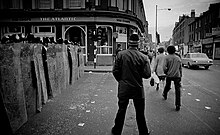Leslie Scarman, Baron Scarman
Leslie George Scarman, Baron Scarman OBE PC QC (born July 29, 1911 in Streatham ; † December 8, 2004 ) was a British lawyer , who was last as Lord of Appeal in Ordinary due to the Appellate Jurisdiction Act 1876 as a life peer also a member of the House of Lords was. As long-time chairman of the Law Commission of England and Wales , he was instrumental in reforming English and Welsh law in the 1960s and 1970s.
Life
Lawyer and officer in World War II
Scarman, in Sussex and Surrey grew up, graduated with financial support from a grant from a degree in Classical Studies at Radley College and at Brasenose College of the University of Oxford , where he graduated in 1932 with honors. He then studied law and received his legal license in 1936, whereupon he took up work as a barrister .
During the Second World War Scarman did his military service as a staff officer of the Royal Air Force (RAF) and found employment in England, North Africa and most recently in Germany , where he joined General Arthur Tedder's staff in May 1945 at the unconditional surrender of the Wehrmacht in Berlin-Karlshorst belonged to. In 1944 he was awarded the Officer's Cross of the Order of the British Empire for his services .
After the end of the war, Scarman joined the renowned London law firm Fountain Court Chambers as a barrister, specializing in particular in commercial and business law. For his lawyer's merits he was appointed in 1957 Attorney-General ( Queen's Counsel appointed). Thomas Henry Bingham , who later became Master of the Rolls and Lord Chief Justice of England and Wales , among other things, was one of his legal assistants in the early 1960s .
Judge, House of Lords and Lord Judge
In 1961 Scarman became a judge in the Family Division at the High Court of Justice responsible for England and Wales and held this judicial office until 1973. During this time, in 1965 he also became the first chairman of the newly established Law Commission , a commission to reform the English and Welsh law. He headed this commission until 1973 and 27 proposals of the commission were implemented into applicable law.
During the Northern Ireland conflict, Scarman, who was an outspoken human rights advocate , headed a commission to investigate the riots in Northern Ireland from August 12-17, 1969.
After completing his judicial activity at the High Court of Justice, in 1973 he was appointed judge ( Lord Justice of Appeal ) at the Court of Appeal , the court of appeal responsible for England and Wales, where he worked until 1977. In addition, he was appointed Privy Councilor in 1977.
Most recently, Scarman was appointed to the nobility by a letters patent dated September 30, 1977 on the basis of the Appellate Jurisdiction Act 1876 as a life peer with the title Baron Scarman , of Quatt in the County of Salop , a member of the House of Lords and served until his Resigned on January 12, 1986 as Lord of Appeal in Ordinary . At the same time he acted as the successor to Cyril Radcliffe from 1977 until his replacement by Shridath Ramphal in 1989 as Chancellor of the University of Warwick .
In the 1980s he was involved with Patrick Devlin, Baron Devlin , who was also a judge on the High Court of Justice, Lord of Appeal and Lord of Appeal in Ordinary, in campaigns that led to the reopening of legal proceedings against the Birmingham Six , Guildford Four and the Maguire Seven .
Baron Scarman also headed a commission to investigate the race riots in Brixton on April 11, 1981 between the Metropolitan Police Service and demonstrators, which resulted in more than 320 injuries. The final report was named Scarman Report after him.
In 1983 he was elected a member of the American Philosophical Society .
Publications
- Pattern of Law Reform , 1967
- English Law: The New Dimension , 1974
Web links and sources
- Chambers Biographical Dictionary , Edinburgh 2002, p. 1346, ISBN 0550 10051 2
- Leslie Scarman at Hansard (English)
- Entry in Leigh Rayment Peerage
- Lords of Appeal in Ordinary 1876-2009 in Peerages
- Lord Scarman, humane chairman of Brixton riots inquiry, dies at 93 . In: The Guardian, December 10, 2004
Individual evidence
- ^ Q&A: The Scarman Report . In: BBC News of April 27, 2004
- ↑ Member History: Lord Leslie George Scarman. American Philosophical Society, accessed February 7, 2019 .
| personal data | |
|---|---|
| SURNAME | Scarman, Leslie, Baron Scarman |
| ALTERNATIVE NAMES | Scarman, Leslie George, Baron Scarman (full name) |
| BRIEF DESCRIPTION | British lawyer |
| DATE OF BIRTH | July 29, 1911 |
| PLACE OF BIRTH | Streatham |
| DATE OF DEATH | December 8, 2004 |
